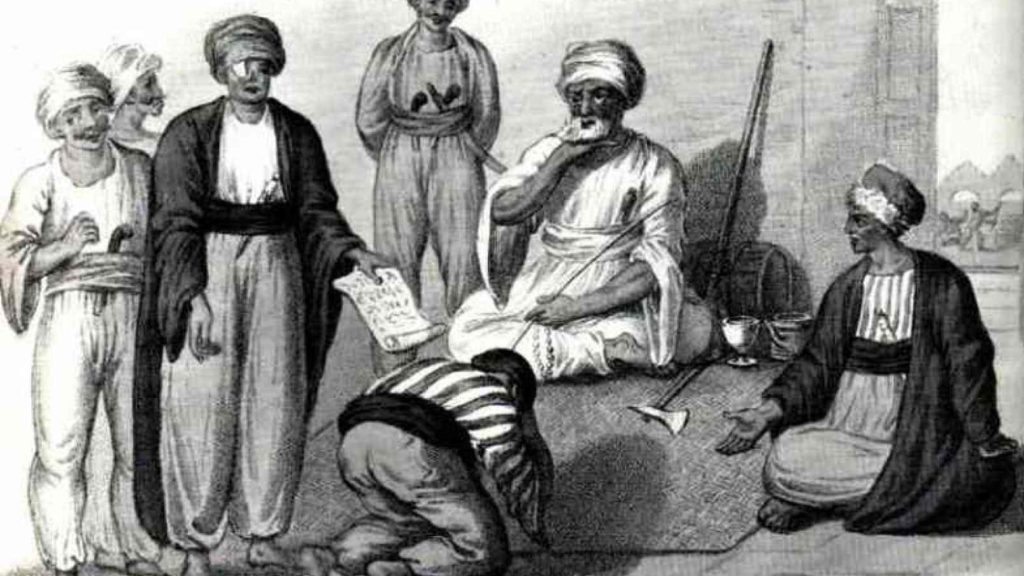
What we know, and what we are told by the audio-visual media and social media, is that Islam is a religion of freedom, love, tolerance, justice, integrity and equality. Those who promote this theme cite as evidence for this the famous verse: There is no compulsion in religion; truly the right way has become clearly distinct from error.[1]
HOWEVER, THEY FORGET that in the most conspicuous of its two elements it is abrogated, and that those who said that it is a muḥkam verse – one where there is no ambiguity of meaning – are saying that freedom is granted as an obligation to the People of the Book even if Islam is offered to them and they reject it. But this is also said at the same time as they acknowledge the validity of the jizya.[2] Their authoritative shaykh on the matter, Shaykh Ibn Bāz, had this to say:
There are two views with respect to this: One is that as regards the People of the Book and the Zoroastrians, they are not to be forced, but are to be allowed to choose between professing Islam or paying the jizya, and if they do not pay either the jizya or adopt Islam, they are to be fought. But all the rest have no choice at all: for them it is either Islam or the sword. Others say, indeed, that this verse was abrogated: that this was the first command, but then Allah subsequently prescribed fighting and jihād, against these people outright, as evidenced by His words: And fight them until persecution is no more, and religion is all for Allah.[3] Therefore this verse and its meaning were abrogated.[4]
Moreover, freedom of belief here is predicated on assuming the Muslim’s domination of a non-Muslim, whether he invades the latter’s land, or enters it as a colonizer, and the jizya is to be paid readily while in a state of subjection:
Fight those who do not believe in Allah, nor in the latter day, nor do they prohibit what Allah and His Messenger have prohibited, nor follow the religion of truth, out of those who have been given the Book, until they pay the tax readily and they are in a state of subjection.[5]
In his commentary on this verse Ibn Kathīr has this to say:
This honourable verse was revealed with the order to fight the People of the Book, after the polytheists had been defeated and people were entering Allah’s religion in droves, and the Arabian Peninsula had been secured under the Muslims’ control. Allah then commanded His Messenger to fight the People of the Scriptures – the Jews and the Christians – in the ninth year of the hijra, and for this the Messenger of God prepared his army to fight the Romans and called the people to this task, announcing his intent to them. The Messenger sent his intention to various Arab areas around Al-Madīna in order to gather his forces, and he collected an army numbering thirty thousand. Some people from Al-Madīna at its outskirts, along with some hypocrites, were dilatory in their response, for that year had been a year of drought and intense heat. The Messenger of Allah went forth towards Al-Shām[6] to fight the Romans until he reached Tabūk, where he struck camp for about twenty days next to its water resources. He then prayed to Allah to return, and then went back to Al-Madīna because it was a harsh year and the people had become weak.
The verse was thus revealed after having dealt with the issue of the polytheists, and after the command to confront to the People of the Book and the obligation made to fight them for the purpose of promulgating the religion, and that if they did not surrender, they were to pay the jizya while ‘in a state of subjection’ (meaning humiliation).
Ibn Kathir says in his commentary that the Christians must be degraded and humiliated and prevented from building new churches
But this is a slander and an affront to the magnanimous sharī’a. They had guaranteed them their freedom to worship and keep their laws. Ibn Kathīr is thus presenting us with a completely different picture. He says in his commentary that they must be degraded and humiliated and prevented from building new churches, and that Al-Farūq ‘Umar ‘the first to be called the Commander of the Faithful’ had imposed humiliating conditions on them. Ibn Kathir goes on to give details:
Now this is why the Commander of the Faithful, ‘Umar ibn al-Khaṭṭāb (may Allah be pleased with him), stipulated those well-known conditions designed to humiliate, belittle and degrade them, and this is what was narrated by the leading annalists, according to the narration of ‘Abd al-Raḥmān ibn Ghanam al-Ash‘arī who said: “In the Name of Allah, Most Gracious, Most Merciful. This is a document to the servant of Allah `Umar, the Leader of the faithful, from the Christians of such and such city. When you (Muslims) came to us we requested safety for ourselves, children, property and followers of our religion. We made a condition on ourselves that:
- We will neither erect in our town or surrounding areas a monastery, church, or a monk’s cell or hermitage;
- Nor restore any place of worship that is falling into ruin;
- Nor use any of them for the purpose of enmity against Muslims;
- We will not prevent any Muslim from resting in our churches whether they come by day or night, and we will keep the doors [of our houses of worship] wide open for the wayfarer and passer-by;
- Those Muslims who come as guests, will enjoy boarding and food from us for three days;
- We will not allow a spy against Muslims into our churches and homes or conceal any treasonous deceit against Muslims;
- We will not teach our children the Qur’ān, make any public practice of shirk or invite anyone thereto;
- Nor will we prevent any of our fellows from embracing Islam, if they choose so to do;
- We will respect Muslims;
- We will move from the places we sit if they choose to sit there;
- We will not imitate their clothing, caps, turbans, sandals, hairstyles, speech, sobriquets or titles;
- Nor will we ride on saddles, girt ourselves with swords on our shoulders, or collect weapons of any kind or carry any of these weapons;
- We will not inscribe our seals in Arabic, nor sell alcohol;
- We will have our forelocks cut short, wear our customary clothes wherever we are, and wear belts around our waist;
- We will refrain from erecting crosses on the outside of our churches or show them or our books publicly in Muslim fairways and markets;
- We will not sound bells in our churches, except discreetly so, nor raise our voices while reciting our holy books inside our churches if there are Muslims present;
- Nor will we raise our voices [in prayer] at our funerals or light torches in funeral processions in the fairways of Muslims, or their markets;
- We will not bury our dead next to Muslim dead, nor purchase servants captured by Muslims;
- We will act as guides for Muslims when asked and refrain from breaching their privacy in their homes.
When ‘Umar read this missive he made an addition:
- We will not beat any Muslim.
These are the conditions that we set to ourselves and to the followers of our religion, in return for safety and protection. If we break any of these promises that we set to your advantage against ourselves, then the promise of protection granted us will be voided and you are allowed to do with us what you do to those who defy you and rebel against you.’

Suggested Reading
Coming back to what Muslim jurists said about those ‘in a state of subjection’ lest we be accused of defamation, in Ibn al-Qayyim’s work Aḥkām Ahl al-Dhimma (‘The Rulings concerning the Protected Peoples’) we read the following:
When Almighty God refers to those ‘ in a state of subjection’ there are other aspects to consider. The first concerns how Muslims are to take the jizya from them, that they are to take it from their hands by force. The second concerns the manner in which they are to pay it, that is that they should feel diminished and belittled. There have been different views on how to interpret their being ‘diminished’ at the time of paying the jizya. Ikrima says that it means that they should pay it while standing, with the taker remaining seated. Another group hold that he is to bring the payment in person, on foot and not mounted, and that he should remain standing when he brings it, and that he should be dragged forcefully to the place he is to deliver it, that his hand is to be snatched at and he should be insulted.
Ibn al-Qayyim goes on:
According to the narration of Ḥanbal,[7] Imam Ahmad said: ‘They used to drag them by hand and place a seal over their necks if they did not yield the tax. It was then said to them: “Do you see that?” To which he said: “Yes,” while in the diminished ‘state of subjection’ that God had stipulated.’ This indicates that if only the dhimmī did his duty and kept himself diminished he would not need to be dragged by the hand and beaten. As Muhanna ibn Yaḥyā narrated, ‘it is desirable that they should feel the burden of the jizya’.[8] And occording to al-Qāḍī, ‘’Umar did not wish to torment them or impose on them what was beyond their means, but wanted them to feel disparaged and humiliated.’
[1] Qur’ān II (al-Baqara), 256.
[2] The per capita tax levied on a section of an Islamic state’s non-Muslim citizens. See Glossary: Jizya.
[3] Qur’ān VIII (al-Anfāl), 39.
[4] See Shaykh Bin Bāz’s fatwā here.
[5] Qur’ān IX (al-Tawba), 29.
[6] The region known at the time as Greater Syria.
[7] الجامع للخلال Vol. 1, pp. 164-5.
[8] Op. cit., p.165.
Main image: Lā ikrāha fī al-dīn – ‘There is no compulsion in religion’ from Qur’ān II (al-Baqara), 256.

